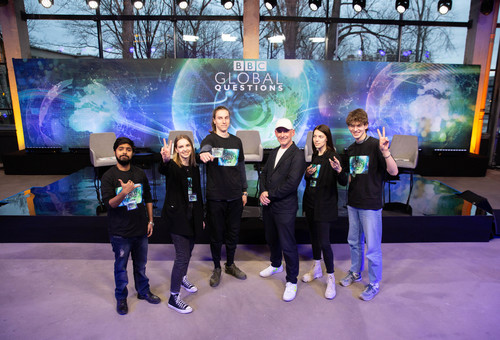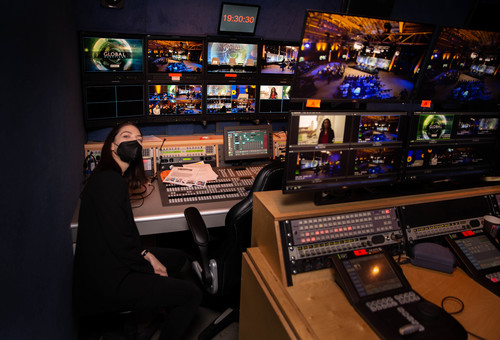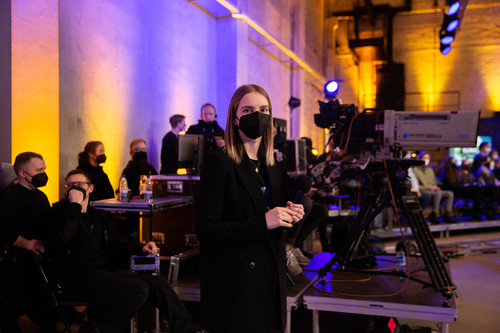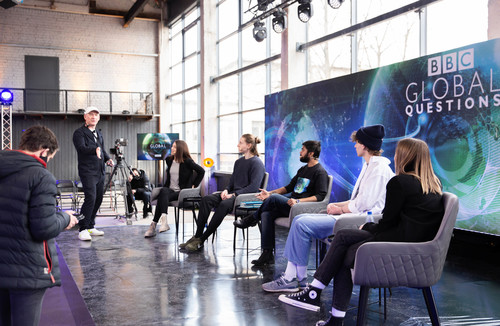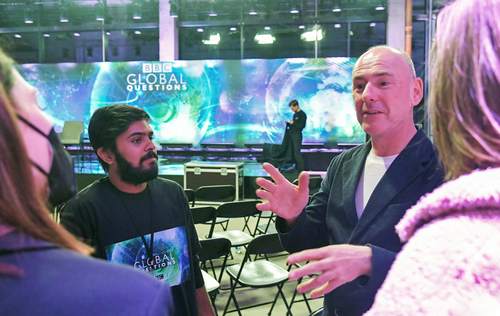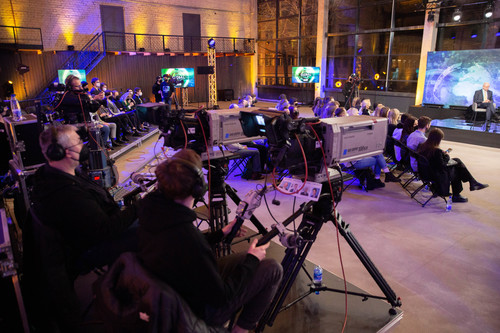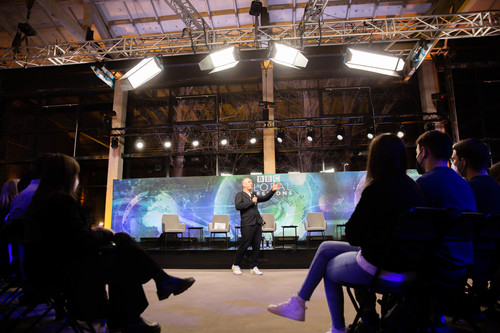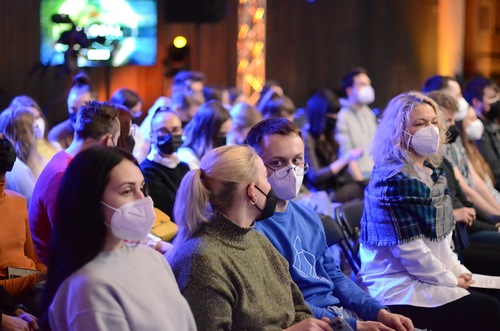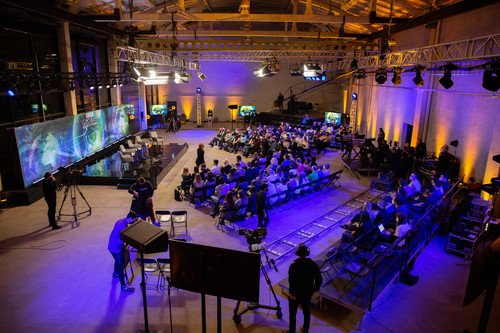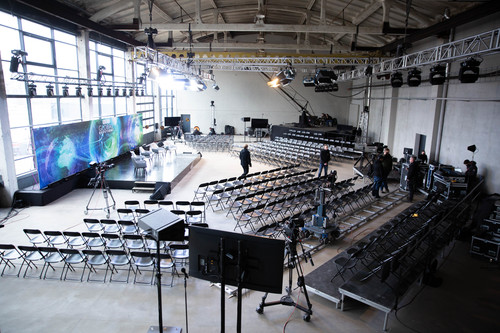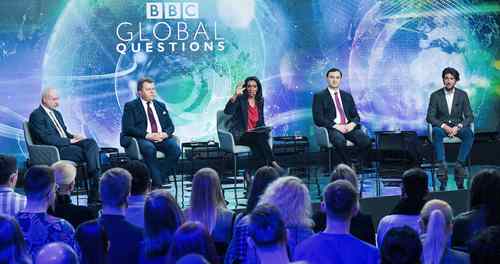- Programmes in English 2025/2026
- Admission 2024/2025 Scholarships
- For exchange students
- Free Movers
- Transfer studies
- Erasmus+ studies and traineeships
- Mentor programme
- Student testimonials
- Accommodation
- Career Services
- Medical Care
- Immigration Regulations
- Leisure and Student Activities
- Useful information
- VILNIUS TECH for Creators of Tomorrow
- Mental and spiritual support
- Representatives Abroad
- Contacts
- Computer Engineering
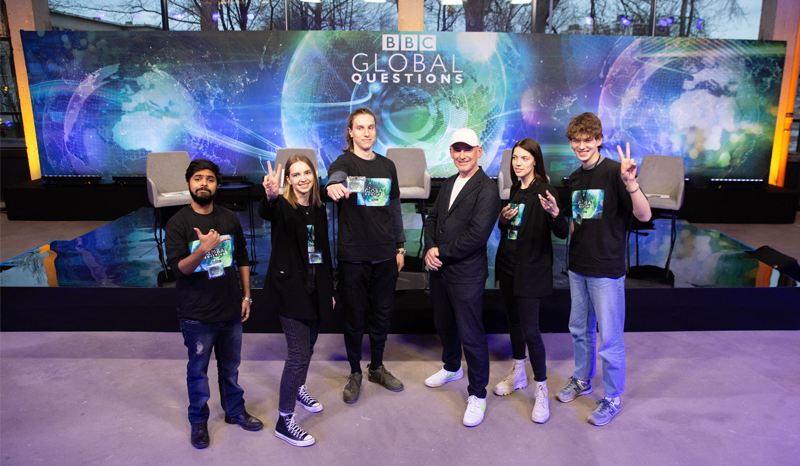
2022-03-14
VILNIUS TECH students had an opportunity to join the team of a BBC
On 7 March, Vilnius Gediminas Technical University (VILNIUS TECH) Creativity and Innovation Centre "LinkMenų fabrikas" turned into a vibrant TV stage - the factory's hangar became a filming location for the "BBC Global Questions" programme. Around two hundred viewers took part in the filming of the show, and five VILNIUS TECH students joined the BBC team itself.
The BBC's international television and radio programme was hosted by Zeinab Badawi. The show featured Lithuanian Deputy Foreign Minister Mantas Adomėnas, Ukraine's Ambassador to Lithuania Petro Beshta, former Director of Policy Planning at NATO Fabrice Pothier, and EU Ambassador and Head of the EU Delegation to Ukraine Matti Maasik. The participants discussed the topic: "After Ukraine: are the Baltics next?".
Behind the scenes of a BBC programme
"Chris Nelson, the director of "BBC Global Questions", contacted us and, as soon as the details of the filming were agreed, offered to invite a few of our students to join the filming of the programme. Five students from the Faculty of Creative Industries and the Faculty of Fundamental Sciences joined the team and worked with BBC professionals for two days. We often invite students to help us on the film sets, yet it is rare to have the invaluable opportunity to work with world-renowned professionals," says Greta Markūnaitė, Head of the Creativity Lab at VILNIUS TECH "LinkMenų fabrikas".
The students who took part in the filming of "BBC Global Questions" highlighted the special attention paid to them by the programme's director, Chris Nelson.
"I always like to invite a group of students to have the opportunity to come and work with me. It's a way of giving back some of my knowledge and years of experience in the hope that it will help them in the future. It's not every day the BBC come to your university and certainly not on this scale," says Chris Nelson, the director of "BBC Global Questions".
"Everyone had different roles, but with their help, we were able to make rehearsals easier. They got the chance to see and feel what it's like in front of 8 television cameras and lights and work in the master control room, sitting next to the director, vision mixing," he adds.
"I think everyone soon realised that television is not that glamourous, and there were several straightforward, but essential, helping the audience roles that also needed to be done."
"Everyone stepped up to the challenge in a such a professional way. There was an enthusiasm and eagerness to learn. The whole team were brilliant, lovely people who will, no doubt, have a successful future," says Chris Nelson.
Student experience
A 3rd-year student of Entertainment Production, Emilija Klumbytė, had the opportunity to contribute to the filming of the "BBC Global Questions" programme. "This experience was another step towards a stronger decision on what I want to do in the future," she says.
The main task of the student was to be a "stand-in" for one of the guests - to sit in the guest's future seat, speaking into the guest's future microphone, so that the technical team could adjust the sound, the lighting, and the other technical nuances accordingly.
"From the outside, it may not seem like an essential position, but for the TV and film industries, it is an important task to get it right," says Emilija Klumbytė.
"Although I learnt about the basics of the film and TV industry during my studies, this was a great opportunity to see how things are put into practice. And especially how this practice is implemented by such a team of professionals," says Greta Palubinskaitė, 2nd-year Multimedia and Computer Design student.
Žygimantas Steponavičius, 3-year multimedia and computer design student, still can't believe that he stood next to the director of the BBC and listened to him talk about his work.
"Director Chris was very enthusiastic in teaching and talking about his work. I never thought that a director's priority would be students. He spent with us an enormous amount of time. I also enjoyed the interaction with the other trainees. Also, it was a nice experience to speak in English because not everyone was Lithuanian", says Žygimantas.
Dmytro Markovskyi, a first-year Creative Industries student from Ukraine, says that even a few days later, he still can't get over the fact that he was allowed to work for two days with the BBC team.
"Even after some time, I still feel very excited and inspired," says the student.
The VILNIUS TECH “LinkMenų fabrikas” hangar
"BBC Global Questions is an international television debate programme viewed around the world, and it's always important to have a great location that fits the discussion and show off where we are. Size is an important consideration. You need enough space to put your live audience, and you need enough space for the television production equipment. An outside broadcast needs a lot of room, not only internally but also externally. We were looking for somewhere that looked amazing but also had our technical requirements. We found it!" says Chris Nelson.
"The VILNIUS TECH “LinkMenų fabrikas” hangar had an edgy, rough look with unfinished walls and a concrete ceiling. The windows also allowed the viewer to see outside and gave them a sense of geography. The industrial windows and concrete pillars added to the feel and vastness of the space. Can you imagine recording a programme in a fancy theatre auditorium or boring conference centre? With this topic, it just wouldn't work," he adds.
"The BBC Global Questions" programme "After Ukraine: are the Baltics next?", which was filmed at VILNIUS TECH "LinkMenų fabrikas", is available here. Password required to view the video: globalq.
The BBC's international television and radio programme was hosted by Zeinab Badawi. The show featured Lithuanian Deputy Foreign Minister Mantas Adomėnas, Ukraine's Ambassador to Lithuania Petro Beshta, former Director of Policy Planning at NATO Fabrice Pothier, and EU Ambassador and Head of the EU Delegation to Ukraine Matti Maasik. The participants discussed the topic: "After Ukraine: are the Baltics next?".
Behind the scenes of a BBC programme
"Chris Nelson, the director of "BBC Global Questions", contacted us and, as soon as the details of the filming were agreed, offered to invite a few of our students to join the filming of the programme. Five students from the Faculty of Creative Industries and the Faculty of Fundamental Sciences joined the team and worked with BBC professionals for two days. We often invite students to help us on the film sets, yet it is rare to have the invaluable opportunity to work with world-renowned professionals," says Greta Markūnaitė, Head of the Creativity Lab at VILNIUS TECH "LinkMenų fabrikas".
The students who took part in the filming of "BBC Global Questions" highlighted the special attention paid to them by the programme's director, Chris Nelson.
"I always like to invite a group of students to have the opportunity to come and work with me. It's a way of giving back some of my knowledge and years of experience in the hope that it will help them in the future. It's not every day the BBC come to your university and certainly not on this scale," says Chris Nelson, the director of "BBC Global Questions".
"Everyone had different roles, but with their help, we were able to make rehearsals easier. They got the chance to see and feel what it's like in front of 8 television cameras and lights and work in the master control room, sitting next to the director, vision mixing," he adds.
"I think everyone soon realised that television is not that glamourous, and there were several straightforward, but essential, helping the audience roles that also needed to be done."
"Everyone stepped up to the challenge in a such a professional way. There was an enthusiasm and eagerness to learn. The whole team were brilliant, lovely people who will, no doubt, have a successful future," says Chris Nelson.
Student experience
A 3rd-year student of Entertainment Production, Emilija Klumbytė, had the opportunity to contribute to the filming of the "BBC Global Questions" programme. "This experience was another step towards a stronger decision on what I want to do in the future," she says.
The main task of the student was to be a "stand-in" for one of the guests - to sit in the guest's future seat, speaking into the guest's future microphone, so that the technical team could adjust the sound, the lighting, and the other technical nuances accordingly.
"From the outside, it may not seem like an essential position, but for the TV and film industries, it is an important task to get it right," says Emilija Klumbytė.
"Although I learnt about the basics of the film and TV industry during my studies, this was a great opportunity to see how things are put into practice. And especially how this practice is implemented by such a team of professionals," says Greta Palubinskaitė, 2nd-year Multimedia and Computer Design student.
Žygimantas Steponavičius, 3-year multimedia and computer design student, still can't believe that he stood next to the director of the BBC and listened to him talk about his work.
"Director Chris was very enthusiastic in teaching and talking about his work. I never thought that a director's priority would be students. He spent with us an enormous amount of time. I also enjoyed the interaction with the other trainees. Also, it was a nice experience to speak in English because not everyone was Lithuanian", says Žygimantas.
Dmytro Markovskyi, a first-year Creative Industries student from Ukraine, says that even a few days later, he still can't get over the fact that he was allowed to work for two days with the BBC team.
"Even after some time, I still feel very excited and inspired," says the student.
The VILNIUS TECH “LinkMenų fabrikas” hangar
"BBC Global Questions is an international television debate programme viewed around the world, and it's always important to have a great location that fits the discussion and show off where we are. Size is an important consideration. You need enough space to put your live audience, and you need enough space for the television production equipment. An outside broadcast needs a lot of room, not only internally but also externally. We were looking for somewhere that looked amazing but also had our technical requirements. We found it!" says Chris Nelson.
"The VILNIUS TECH “LinkMenų fabrikas” hangar had an edgy, rough look with unfinished walls and a concrete ceiling. The windows also allowed the viewer to see outside and gave them a sense of geography. The industrial windows and concrete pillars added to the feel and vastness of the space. Can you imagine recording a programme in a fancy theatre auditorium or boring conference centre? With this topic, it just wouldn't work," he adds.
"The BBC Global Questions" programme "After Ukraine: are the Baltics next?", which was filmed at VILNIUS TECH "LinkMenų fabrikas", is available here. Password required to view the video: globalq.












